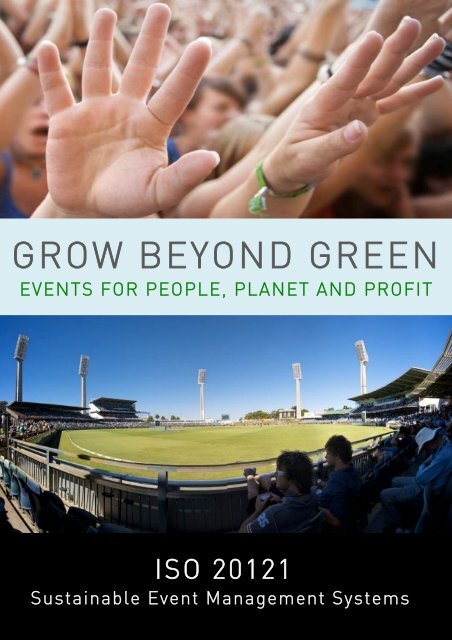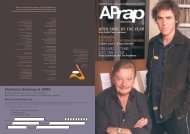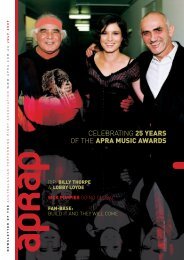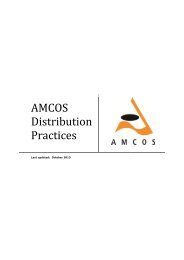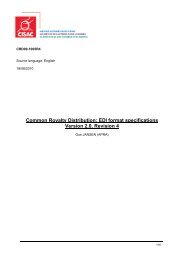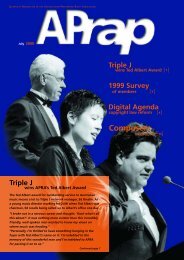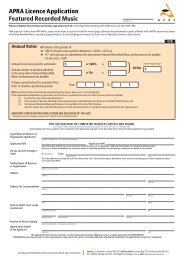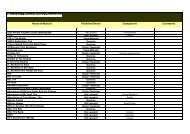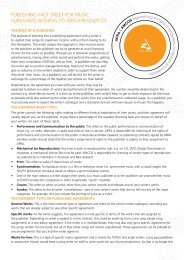GROW BEYOND GREEN - APRA
GROW BEYOND GREEN - APRA
GROW BEYOND GREEN - APRA
Create successful ePaper yourself
Turn your PDF publications into a flip-book with our unique Google optimized e-Paper software.
<strong>GROW</strong> <strong>BEYOND</strong> <strong>GREEN</strong><br />
EVENTS FOR PEOPLE, PLANET AND PROFIT<br />
ISO 20121<br />
Sustainable Event Management Systems
The event industry is witnessing<br />
a growing trend to ensure<br />
understanding of the<br />
sustainability impacts of<br />
producing events, and to<br />
establish systems to<br />
identify and manage<br />
issues and impacts with<br />
positive outcomes.<br />
Why<br />
implement ISO 20121?<br />
Event organisers be they<br />
community, corporate or<br />
government, are all<br />
embracing the powerful<br />
opportunity to show<br />
sustainability-in-action at<br />
their events, to reduce the<br />
impacts of their event’s<br />
production, and to enhance<br />
the enduring legacies left<br />
behind.<br />
ISO 20121 supports these<br />
event sustainability<br />
ambitions – offering a<br />
credible framework to<br />
manage sustainability,<br />
ensure continual<br />
improvement and provide<br />
verifiable recognition of<br />
sustainability outcomes<br />
and performance claims.<br />
MEET<br />
EXPECTATIONS<br />
Those that attend events,<br />
along with talent and<br />
performers, sponsors,<br />
government and the wider<br />
community, are all<br />
increasingly expecting<br />
events and the venues that<br />
host them, to be operated<br />
sustainably. Implementing<br />
ISO 20121 assures<br />
stakeholders you have your<br />
systems in place to allow<br />
great performance.<br />
SAVE MONEY<br />
Shrinking budgets and a<br />
need to for leaner events<br />
using fewer resources and<br />
reducing expenditure while<br />
still maintaining quality<br />
production outcomes has<br />
turned producers toward<br />
sustainable event<br />
production practices.<br />
CORPORATE<br />
IMPERATIVE<br />
Matching corporate policy<br />
with event production,<br />
ensuring production<br />
practices meet the<br />
company’s CSR goals,<br />
shareholder expectations,<br />
and company board<br />
directives, also drives event<br />
producers to embrace<br />
sustainable event<br />
management principles.<br />
REPUTATION<br />
Gaining competitive<br />
advantage and meeting<br />
client and sponsor<br />
requirements in a<br />
competitive industry are<br />
driving producers, venues<br />
and the supply chain to<br />
implement an event<br />
sustainability management<br />
system and conform to<br />
ISO 20121.
.<br />
To support the<br />
requirement for<br />
events to be produced<br />
with regard for<br />
people, planet<br />
and profit,<br />
the new International<br />
Standard ISO 20121,<br />
provides a framework<br />
to effectively manage<br />
event sustainability<br />
issues and enhance<br />
positive legacies.<br />
Gain Greening Know-How<br />
Conserve Resources<br />
Save Money<br />
Inspire Others<br />
Improve Sustainability<br />
Report on Performance<br />
Enhance Reputation<br />
Receive Recognition
What <br />
is ISO 20121? <br />
ISO 20121: Events Sustainability<br />
Management Systems is a standard<br />
developed by participating ‘standards<br />
bodies’ from various countries around the<br />
world. It is a management system<br />
standard and is similar in structure to<br />
other international standards such as<br />
ISO 14001 (Environmental Management<br />
Systems) and ISO 9001 (Quality<br />
Management Systems).<br />
The purpose of the standard is to provide<br />
a framework to implement a system to<br />
manage an event’s sustainability issues.<br />
✗ It is not a checklist<br />
✗ It is not just about counting GHGs<br />
ISO 20121 requires a systematic approach<br />
to addressing sustainable development<br />
issues in relation to event planning.<br />
The steps include:<br />
✔ Getting top management commitment<br />
and defining principles of sustainable<br />
development that the organization<br />
stands for.<br />
✔ Informing and engaging stakeholders<br />
into the event sustainability agenda and<br />
designating roles and responsibilities.<br />
✔ Ensuring enough resources are<br />
provided, including skills, time and<br />
budget.<br />
✔ Establishing policy and setting<br />
objectives.<br />
✔ Identifying sustainability issues.<br />
✔ Managing sustainability issues and<br />
taking action to correct and improve.<br />
✔ Maintaining communication flow.<br />
✔ Documenting processes.<br />
✔ Monitoring performance, including a<br />
management review and ensuring<br />
continual improvement.
Who<br />
is ISO 20121 for?<br />
The standard has been designed to be flexible, so it can apply to all types of<br />
events and the supply chain that service them. If you have any kind of eventrelated<br />
activity, then the standard is right for you!<br />
Event Owner/Sponsor<br />
Those organizations that own events, but<br />
contract external organizations to<br />
manage and deliver their events can<br />
implement an event sustainability<br />
management system for all their<br />
organization’s event-related activities.<br />
A good example is a corporation requiring<br />
business events to be produced<br />
throughout the year but contracts various<br />
companies to do the event production.<br />
Another example is a company that<br />
sponsors events and who has brand<br />
activation at events, or who may in fact<br />
create events around their own<br />
product/company or brands.<br />
In these cases the organization would<br />
have an event sustainability management<br />
system in place to cover all of their eventrelated<br />
activities for their company.<br />
These organizations may additionally<br />
require that the event organizer they<br />
contract, events they agree to fund<br />
through sponsorship, venues they choose<br />
to host their events, or other areas of the<br />
supply chain are all also compliant with<br />
ISO 20121.<br />
Events<br />
One off or recurring events, whether<br />
owned and self-managed, or managed by<br />
an external organization, can have an<br />
event sustainability management system<br />
in place and become compliant with the<br />
requirements of the standard. The scope<br />
or boundary would be the event’s<br />
activities, rather than other year-round<br />
event activities by the organizing company<br />
or event owner.<br />
In some circumstances an organization is<br />
created just for the production and<br />
delivery of a single event, and in this case<br />
the management system would apply to<br />
both the event and the organizing entity<br />
who are in reality one and the same as the<br />
organizing body has no other activities<br />
apart from the event in question.<br />
Event Organizer<br />
Companies that are contracted to produce<br />
events on behalf of clients can become<br />
compliant with the standard. The event<br />
organizing company will have a<br />
management system in place that guides<br />
the production of events they manage. It is<br />
expected this group will make up the bulk<br />
of the entities implementing the standard.
The complexity of your event<br />
sustainability management system<br />
need only mirror the complexity of<br />
your event-related activities.<br />
Venues<br />
Venues that host client’s events, or that<br />
run venue-owned events can implement<br />
an event sustainability management<br />
system and conform to the requirements<br />
of the standard.<br />
Examples of venues can be hotels with<br />
conferencing and gala ballroom facilities,<br />
parks and gardens, purpose-built<br />
conference centres, stadia and arenas,<br />
leisure complexes, sports grounds,<br />
exhibition centres, and the huge variety of<br />
boutique, unique, small to medium<br />
venues.<br />
Suppliers<br />
Those that supply products and services<br />
to the event industry can also achieve<br />
compliance to the standard for their<br />
event-related activities.<br />
This can include labour supply companies<br />
such as waste and security staffing, waste<br />
companies, power companies, staging<br />
and infrastructure, amenities providers,<br />
décor and dressing, and of course likely<br />
candidates – caterers, food and beverage<br />
stallholders and bar operators.
How<br />
to achieve conformity?<br />
Conformity with ISO 20121 means your organization has met the<br />
requirements of the standard in implementing an event sustainability<br />
management system. You can achieve conformity in one of three ways:<br />
First Party<br />
This is where an<br />
organization assesses its<br />
own system and makes a<br />
self-declaration of<br />
conformity with the<br />
requirements of the<br />
standard. This is an<br />
‘internal audit.’<br />
Second Party<br />
An external party conducts<br />
an independent conformity<br />
assessment of your<br />
conformity to the<br />
requirements of the<br />
standard. The SEMS Tool<br />
and Audit is a Second Party<br />
assessment program.<br />
Third Party<br />
Accredited Certifying<br />
Bodies conduct third party<br />
conformity assessment<br />
audits and award ‘ISO<br />
20121 Certification’. These<br />
Certifying Bodies must be<br />
‘accredited’ (authorized to<br />
certify).<br />
USE THE SEMS TOOL<br />
TO SET UP YOUR<br />
MANAGEMENT SYSTEM<br />
USE THE SEMS TOOL<br />
TO GET CONFORMITY<br />
READY & GET AUDITED<br />
USE THE SEMS TOOL<br />
STREAMLINE YOUR<br />
3 RD PARTY AUDIT
Second Party Conformity Assessment<br />
Sustainable Event Solutions conducts Second Party Assessments<br />
for conformity to ISO 20121 using the SEMS Tool<br />
To streamline the process and add<br />
maximum benefit to the client we use the<br />
SEMS tool to support the audit process.<br />
This ensures the steps to second party<br />
conformity assessment are as simple as<br />
possible, but also that it establishes a<br />
management system for your<br />
organization/venue/event that can be used<br />
going forward.<br />
An easy and comprehensive way to do this<br />
is using the SEMS tool. The SEMS tool is<br />
the online Sustainable Event Management<br />
System tool of choice for any event<br />
anywhere in the world.<br />
SEMS assists users to plan, monitor,<br />
measure, check, act and report on the<br />
sustainability performance of their<br />
organisations and events. It includes<br />
comprehensive education modules, builtin<br />
calculators for performance<br />
measurement, and a policy wizard as<br />
industry leading features. By<br />
implementing SEMS across your<br />
event/organization you will be on your way<br />
to becoming ‘conformity ready’.
The process of achieving<br />
Second Party Conformity Assessment<br />
Step One<br />
Purchase a copy of ISO 20121 to<br />
understand the requirements of the<br />
standard, from your national standard’s<br />
body.<br />
Step Two<br />
Implement your management system<br />
using the SEMS TOOL (US$350). To<br />
understand how to implement the a<br />
management system, access these<br />
resources:<br />
- Short Guide to ISO 20121<br />
- ISO 20121 Implementation webcast<br />
Step Three<br />
Conduct a self-assessment, through the<br />
SEMS internal audit to determine if you<br />
are ‘conformity ready’ and also through<br />
exporting your Self Assessment Report.<br />
Step Four<br />
Request a quotation for conformity<br />
assessment here.<br />
Step Five<br />
Submit your event for an Audit through<br />
the SEMS Tool. Get a Quote Now!<br />
Step Six<br />
Your submission will be allocated to your<br />
assigned Auditor. The Auditor conducts a<br />
desktop audit of your management<br />
system. If the risk of non-conformity at<br />
the event is high and it is deemed<br />
necessary by the Auditor that a live<br />
visitation is required, this will be<br />
discussed with you.<br />
Step Seven<br />
The Auditor finalizes the audit and it is<br />
validated by Sustainable Event Solutions’<br />
Audit Manager. An audit report is included<br />
with suggestions for any continual<br />
improvement, and also requirements for<br />
correction of non-conformities for the<br />
next audit.<br />
Step Eight<br />
Sustainable Event Solutions provides you<br />
marketing material to assist in the<br />
promoting your conformity to ISO 20121.<br />
CONTACT US TO BEGIN<br />
YOUR JOURNEY TO<br />
IMPLEMENTING ISO 20121
Who are our auditors?<br />
Our worldwide team of highly experienced<br />
and industry-leading professionals use<br />
their expert knowledge in implementing<br />
event sustainability management systems<br />
and solutions to conduct audits of<br />
conformity to ISO 20121.<br />
Our auditors are all Sustainable Event<br />
Alliance Accredited Professionals. They<br />
have experience in implementing<br />
ISO 20121, and have been trained in the<br />
audit process. They have additionally<br />
successfully completed competency<br />
assessments in event sustainability<br />
subject knowledge, management system<br />
implementation and audit process, under<br />
the direction of an accredited third party<br />
lead auditor.<br />
✔ UK & Ireland<br />
✔ Europe & Eastern Europe<br />
✔ Scandinavia<br />
✔ Turkey<br />
✔ UAE<br />
✔ India<br />
✔ South East Asia<br />
✔ China<br />
✔ Japan<br />
✔ Australia<br />
✔ New Zealand<br />
✔ Canada<br />
✔ United States<br />
✔ Mexico<br />
✔ Peru<br />
✔ Brazil<br />
✔ Argentina
Sustainable Event Solutions provide<br />
sustainability frameworks and tools to educate<br />
industry and community globally and enable<br />
measurable performance outcomes. SES’s<br />
intent is to produce world’s best tools enabling<br />
our clients to remain ahead of the sustainability<br />
curve therefore demonstrating leadership and<br />
achieving measureable results.<br />
Our flagship, the SEMS Tool is a world leader in<br />
sustainability frameworks, enabling integration<br />
of responsible, efficient and ethical business<br />
practice into our client’s events. This enables<br />
improved sustainability performance and<br />
business excellence. SEMS has been developed<br />
to educate event producers, provide a<br />
mechanism for measuring sustainability<br />
improvements, results and innovation to reduce<br />
the negative environmental and social impacts<br />
of an event and to enhance the positive legacies<br />
resulting.<br />
www.semstoolkit.com<br />
© The Watermark Group Sustainable Event Solutions Pty Ltd 2008. All rights reserved.


